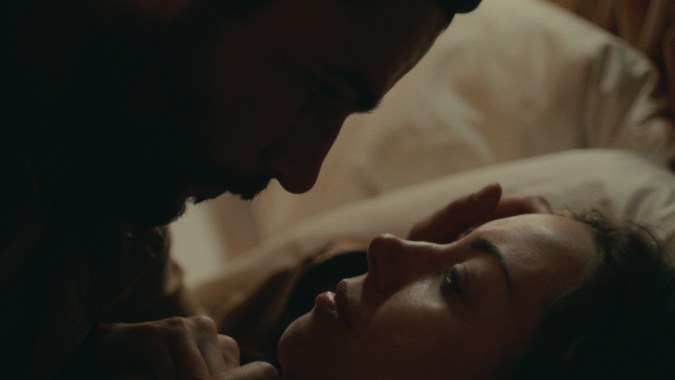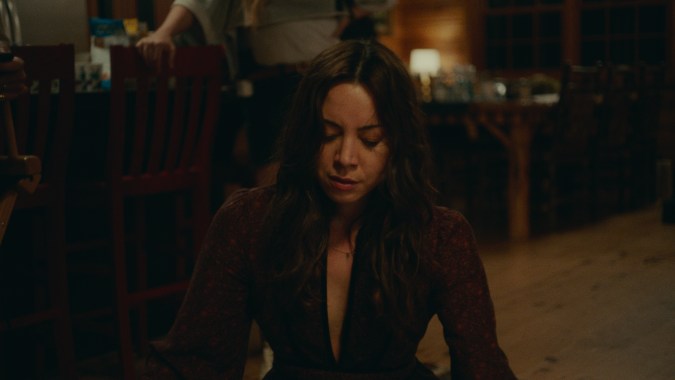Perturbed (or perhaps in knowing anticipation), Allison (Aubrey Plaza) stares out into the uncanny void of a foggy lake in the opening shots of writer-director Lawrence Michael Levine’s cerebral, multi-angle drama, Black Bear. She could, however, just as likely be pointing her piercing gaze directly at us, burning through the protection of the screen to bridge reality with the meta realm where the story unfolds.
In a similar fashion, the film itself crosses the borders of perspective and interpretation time and again. That image of her in a red swimsuit sitting on a wooden boardwalk later functions as a point of reference, a reset button for the rest of the thoroughly absorbing, two-part narrative. With the intensity of a writer repeatedly reworking a paragraph, Levine’s movie comments on the ethics of fabricating lives and emotions for the screen.
Filmmaker Allison arrives at a lavish cabin tucked away in a forest: The ideal hideaway to recharge and be receptive to new ideas. Her hosts, Gabe (Christopher Abbott) and Blair (Sarah Gadon), an unmarried couple expecting their first child, quickly prove to be a divided front on the brink of a split-up.

“You are really hard to read,” Blair tells Alison while the three have dinner. Those familiar with Plaza’s output may read that statement as a wink. Is she talking about the character or the actress’s persona?
From her first line, Plaza boasts her signature irony, employed here to push the uncomfortable situations—grounded on a passive-aggressive marital dispute—deeper, and into fascinatingly awkward terrain. Tensions mount as Gabe (a musician) and Blair (a dancer) reveal more about who they are, why they are there, and their ideological disagreements. Seemingly a witness, but also probably an instigator, Allison attempts to politely diffuse their arguments about gender roles and the line separating a hobby from a profession. As their love façade crumbles, we can’t look away from its enthralling, verbal demolition.

Up to this point, Plaza walks within the boundaries of what’s often seen from her, which is important for the magnitude of her astounding range to fully register in the film’s second half. Allison’s arrival is like a drop of water in hot oil, but when the night runs its turbulent course, an actual bear, serving as a wrench in the plot, brings us back to the starting line.
That’s when Levine pulls the rug violently and reintroduces the same cast at the same place in a paralleled love triangle, but with even more deranged implications. Abbott now plays a director gaslighting his star and romantic partner (Plaza) with the help of a co-star (Gadon) in order to get what he wants out of her on camera.
It’s a career-best performance.
In the role of that victimized actress in turn playing a victim on the set of an indie drama, Plaza soars. It’s a career-best performance that begins in a nonchalant place of comfort and ends in absolute devastation. Her undecipherable quality that so often works for dry comedy, here gives way to acting that’s difficult to watch for its perceived rawness.

Such a jaw-dropping turn, and the admiration we feel for it, taps into the very questions Levine poses about the way we tend to fetishize how thespians believably replicate an emotional state—at any cost. We learn, through the story put in front us, that the fictional actress Plaza embodies suffers immensely while acting, as she has been led to believe her lover has been unfaithful, but what did Plaza have to undergo to emit such palpable pain?
Minimalist in scope—one location and a small cast—but enormous in its discourse, Black Bear gets slightly too caught up in the artifice of the thesis but works both on an engaging, dramatic level (we care for the characters at hand in both sections), and as an exercise to critique the methodology used to achieve portrayals that resemble human truth. What’s revealed is that maybe the only way is to actually experience them.
It’s a brilliant, if excessively heady, premise.
How far is it okay for a storyteller to manipulate people, whether actors or not, to accomplish the desired effect without falling into exploitation? It’s a brilliant, if excessively heady, premise.
Playing double and distinct parts as well, Abbott and Gadon match Plaza’s sharp tonal shifts as distinct characters from one act to the next, particularly in the final throes of the movie, where cinematographer Robert Leitzell’s camera moves lively through the house with an array of behind-the-scenes characters in the fake production. That level of complicit speaks volumes to Levine’s directorial skills. At that peak of mostly serious energy, we find humorous relief with Puerto Rican actress Paola Lázaro in the role of production assistant Cathya who ate bad tilapia. Though brief, it’s heartening to see Plaza, also of Puerto Rican descent, share screen time with her. The two Boricuas surely earn the most attention in a richly-layered and superbly portrayed concept that demands analysis.
Black Bear is now available on VOD .




